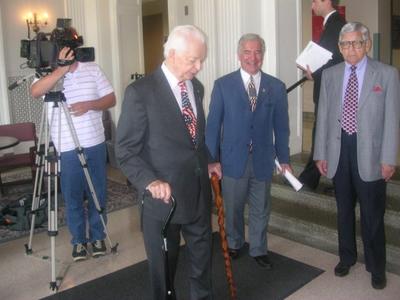Governor Manchin is preparing an all-out push to legalize Las Vegas-style table games at the state's four dog and horse tracks during a special legislative session scheduled to begin September 7. Manchin, whose campaign for governor received tens of thousands of dollars from the gambling industry, supported an unsuccessful effort during the regular session earlier this year to bring full-blown casino gambling to West Virginia.
 In an attempt to make table games more palatable to a conservative state, Manchin wants a table games bill to contain additional regulations of the thousands of mini-casinos featuring 5 or 10 video poker machines each that have spread throughout this state like kudzu since legislators and former Governor Bob Wise legalized video poker in 2001. As I discuss in the last paragraph below, the saddest part of this whole issue is that the Republican caucus in the state Senate has the power to stop this but will not.
In an attempt to make table games more palatable to a conservative state, Manchin wants a table games bill to contain additional regulations of the thousands of mini-casinos featuring 5 or 10 video poker machines each that have spread throughout this state like kudzu since legislators and former Governor Bob Wise legalized video poker in 2001. As I discuss in the last paragraph below, the saddest part of this whole issue is that the Republican caucus in the state Senate has the power to stop this but will not.
Gambling supporters say that the moral question of gambling is irrelevant to table games because the state long ago decided the basic moral question of state-sanctioned gambling. One bad act begets another.
 A decade ago, the gambling lobby began its push for slot machines at the tracks in Maryland, Pennsylvania, and West Virginia. Lobbyists told all three states that they could make hundreds of millions of dollars for their respective states and create thousands of jobs with slots. Moreover, they told legislators in each state that the other two states were about to do the same and they should act fast to prevent this potential loss. Guess who fell for it? West Virginia. Pennsylvania bit the bait last year but has yet to put any slots online. Maryland is still holding firm, even though they're doing so at the "loss" of the millions of dollars Marylanders spend at tracks in West Virginia and Delaware.
A decade ago, the gambling lobby began its push for slot machines at the tracks in Maryland, Pennsylvania, and West Virginia. Lobbyists told all three states that they could make hundreds of millions of dollars for their respective states and create thousands of jobs with slots. Moreover, they told legislators in each state that the other two states were about to do the same and they should act fast to prevent this potential loss. Guess who fell for it? West Virginia. Pennsylvania bit the bait last year but has yet to put any slots online. Maryland is still holding firm, even though they're doing so at the "loss" of the millions of dollars Marylanders spend at tracks in West Virginia and Delaware.
Now, the lobbyists are going for table games here in West Virginia with the threat that the three tracks bordering Maryland and Pennsylvania will lose all their customers and they need table games to keep their businesses going. Keep in mind that many of these gambling operators are also have tracks in Pennsylvania and Maryland that are supposedly competing against them. Our Legislature is being played for a fool (and most of us understand why) and if the gambling lobby gets table games, rest assured they will then go to Harrisburg and Annapolis and ask for the same there.
The greatest reason for my objections to the continuing expansion of gambling in West Virginia are not so much on the basic morality of gambling but on the fact that of all the gambling addicts out there, our state government is the biggest one of all. In the mid-1980s, they wanted another fix of money, so they got the lottery. Then, that wasn't enough, so they got betting at the tracks. Then, in the mid-1990s, the earlier fix wearing off, they anted up and went for slots at the tracks. Then in 2001, wanting money for what became the biggest Christmas tree to ever emerge from the Legislature, they legalized mini-casinos of 5 or 10 video poker machines each in every community in this state. Now, wanting money for public employee pay raises and paying off the state's unfunded liabilities, table games are on the table. Are we really going to roll the dice on this? Do we really believe that the trip down this slippery slope will finally end with full-scale Las Vegas-style gambling (although without the same tourist orientation of Vegas or the very low taxes Nevada uses its gambling revenues to sustain)?
What's next, prostitution? Maybe not that outrageous for a state that has prostituted itself to the gambling industry for the lure of the almighty dollar.
Finally, the saddest part of the whole table games issue is that the bill had the support of five Republican state senators during the regular session. The bill does not have enough Democratic votes to pass without several Republicans crossing over. I give a couple of senators, Andy McKenzie and even John Yoder, a pass because they represent districts with tracks. However, I cannot understand why Charlie Lanham, RINO-Mason, Karen Facemeyer, R-Jackson, and Sarah Minear, R-Tucker, would support this. What's even worse, Facemeyer cast the deciding vote in 2001 for the video poker bill, which passed the Senate without a vote to spare (it passed 18-16). Without their votes, the bill would die and never see the light of day again. Our party is now in much better shape than it was six months ago to crack the whip and enforce party discipline and must make opposition to table games--no matter what concessions are offered to make the bill more palatable--a nonnegotiable litmus test for legislators whose districts do not include tracks. Death would befall the gambling movement in this state and we could then focus on growing those parts of the economy that are actually productive and make a positive contribution to society.
Each Republican senator who voted for the table games bill is pictured below.






 In an attempt to make table games more palatable to a conservative state,
In an attempt to make table games more palatable to a conservative state,  A decade ago, the gambling lobby began its push for slot machines at the tracks in Maryland, Pennsylvania, and West Virginia. Lobbyists told all three states that they could make hundreds of millions of dollars for their respective states and create thousands of jobs with slots. Moreover, they told legislators in each state that the other two states were about to do the same and they should act fast to prevent this potential loss. Guess who fell for it? West Virginia. Pennsylvania bit the bait last year but has yet to put any slots online. Maryland is still holding firm, even though they're doing so at the "loss" of the millions of dollars Marylanders spend at tracks in West Virginia and Delaware.
A decade ago, the gambling lobby began its push for slot machines at the tracks in Maryland, Pennsylvania, and West Virginia. Lobbyists told all three states that they could make hundreds of millions of dollars for their respective states and create thousands of jobs with slots. Moreover, they told legislators in each state that the other two states were about to do the same and they should act fast to prevent this potential loss. Guess who fell for it? West Virginia. Pennsylvania bit the bait last year but has yet to put any slots online. Maryland is still holding firm, even though they're doing so at the "loss" of the millions of dollars Marylanders spend at tracks in West Virginia and Delaware.




 A federal grand jury has indicted Lincoln County Assessor Jerry Weaver for buying votes in several elections. The Charleston Gazette has reported previously that a cooperating witness has testified to driving to Weaver's home and receiving from Weaver bags filled with cash and "slates," or lists of candidates endorsed by a particular person or group. Votes are alleged to often be bought for $10 or $20 for a full slate. The money is said to be usually supplied by candidates who buy their way onto a slate.
A federal grand jury has indicted Lincoln County Assessor Jerry Weaver for buying votes in several elections. The Charleston Gazette has reported previously that a cooperating witness has testified to driving to Weaver's home and receiving from Weaver bags filled with cash and "slates," or lists of candidates endorsed by a particular person or group. Votes are alleged to often be bought for $10 or $20 for a full slate. The money is said to be usually supplied by candidates who buy their way onto a slate.

 Will it happen?
Will it happen?


